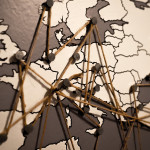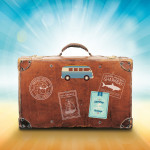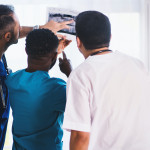Just because you're going on vacation doesn't mean you have to or should give up all the healthy habits you've learned at home. Nothing ruins a vacation like a travel illness or injury. We hope these tips for staying healthy while traveling will help you make the most of your time and eliminate the need for travel insurance in case of an emergency.
How to Stay Healthy While Traveling
Eat well
How to eat healthy while traveling is important to many of us. Eating tends to be harder to manage when you're on the go, not to mention overwhelmed with new and decadent food temptations.
First and foremost, remember that it's perfectly fine to treat yourself while on vacation. Experiencing a place through its local flavors is part of the adventure and should be seized.
Create a meal plan the same way you plan hotels and activities. "Planning will help you maintain your current healthy habits while enjoying the treats and pampers of the holiday season," says St. Louis-based registered dietitian, certified personal trainer, Vibrant Nutrition & Fitness. says owner Julie Przybyla. "Research your destination and plan a meal to treat yourself to. Then fill in the blanks for healthier options that are already part of your diet. I appreciate the familiar texture of food.
Pack your own snacks if you're going out all day. Focus on foods that are portable and satisfy your hunger, such as nuts and fruits. Bringing your own also saves on travel costs
How can I eat healthy at a hotel while on vacation?
Even if your vacation home has a kitchen, you'll probably eat out a lot when you're traveling. This can make it difficult to eat healthy while on vacation.
Restaurants and hotels, especially in the United States, are notorious for serving massive amounts. Ask if half servings can be provided, or search the menu for "lighter" options that are often part of other menu items. "These dishes are often leaner cuts of meat served with non-starchy vegetables such as broccoli, asparagus, and squash," says Julie. So check out these menu items."
You can eat healthy even if you eat out. As Julie said, it's all about making a simple strategy before she leaves home.
"Again, it's okay to eat more fun meals, but if you want to eat lighter, fill up on veggies first," she recommends. "Salad and water ahead of time. When ordering, look for something with a lot of vegetables other than potatoes. When the plate comes, eat it first, then meat, starch, and other things."
Is it okay to eat street food while traveling?
Especially when traveling abroad, it is unrealistic not to eat street food. Some of the most delicious treats I've ever eaten have come from roadside stalls (think of you, empanadas from a random hut on a Chilean highway). So consider carefully which ones to try instead of avoiding them altogether. Seven Corners author Luke Armstrong shares tips from his 10+ years of traveling to more than 30 countries.
- Do not eat street food when there are small children in the stall. Guess where these hands are, straight out of the diaper?
- Avoid lettuce, uncooked cabbage, strawberries, and other produce that grows near the ground where livestock manure is washed away by rain.
- Cooked or peeled foods, such as bananas, oranges, and grapefruits, are often safer than eating them raw or with the skin on.
- Pay attention to the condition of food in the stable. Does it look fresh and inviting? Does it look like it's been on the grill all day? Is the traffic flow through the stands steady or does it appear stagnant?
- When in doubt, ask the food to be cooked longer or avoid it and find your next meal elsewhere.
Drink well
Staying hydrated is just as important, if not more, than eating well. Not drinking enough water can cause you to experience worse symptoms such as fatigue, headaches, irritability, and even fevers.You don't want these things interrupting your vacation. Bring water when exploring the area or always have plenty of water while relaxing on the beach. Foods such as watermelon and other fruits, lettuce, cucumbers, celery, spinach and mushrooms also provide water.
If you're in a tropical location, Luke recommends using coconut, which contains electrolytes similar to Gatorade and, if flavorless, has less sugar and fewer calories.
Shall we drink some water?
Depending on where you travel, it may be safer to drink bottled or treated water than tap water. If you are unsure, check with the Centers for Disease Control and Prevention or your local government. It's also a good idea to brush your teeth in these areas and rinse your toothbrush with mineral water.
If you're flying to another country where you can't drink water, it's a good idea to fill a reusable water bottle at the airport before you leave so you can clear liquids through TSA security. You don't have to try to get a , but you can have something to drink when you land. This has saved me many times when I couldn't get to the bottled water store right away and needed something to drink due to jet lag headaches. When it comes to clean drinking water, we tend to think of it only in underdeveloped countries, but that's not the only thing we have to be careful about.
Be aware of drinking stream or river water when camping in any country. These can contain bacteria from animal waste and can lead to serious illness and even death. Avoid drinking water from still or stagnant bodies of water. Either way, it's best to treat the water with water purification tablets before drinking.
Sleep well.
Everyday life looks different when you travel. Sometimes that's why we travel. A good night's sleep is still a good idea. The more rest you have, the more awake you will be. This is important when you are in an unfamiliar place, helping you make better decisions and be aware of your surroundings. The less cautious you are, the more likely you are to make mistakes that can get you into dangerous situations.
Good sleep boosts your mood, reduces stress, and keeps your immune system functioning properly.
Play smart.
Do you need to exercise while on vacation? It depends on you and your fitness goals. As a rule of thumb, though, it's a good idea to maintain at least a little bit of your routine. If you typically do yoga three times a week, stretch in the morning or meditate before bed. If you need some cardio, enjoy an early morning run or walk before sightseeing.
I think it's best to stick to a routine that makes you feel happy and healthy, but don't let your exercise routine get you off track. Your body may welcome physical rest and a change in routine, but if your mental health calls for regular activity, stick with it.
What adventure activities can you do on vacation? It's good to get out of your comfort zone when traveling. This is how you discover new foods and meet interesting people. Part of that is trying new things.
Whether you're biking, surfing, or canoeing, do it safely. Avoid activities that involve unnecessary risks and tour operators that do not take proper safety precautions. We hope you have travel insurance before you travel, but remember that "adventure activities" such as jet skis and bungee jumping may not be covered unless you choose to add coverage. It is important to keep It can also be difficult to find medical help if you are injured in a remote area or elsewhere in the medical system.
Pack the medicines you need.
If you take medication regularly and are traveling internationally, it is important to have enough medication for the entire trip, plus extra in case you return home late. Finding the same strains, brands, and dosages that you get at home can be difficult. The same is true for some over-the-counter drugs.
Also, it would be nice to know how and when other travelers take their medications. For example, if you have an EpiPen, does anyone in your group know where it is located and how to manage it?
Finally, when traveling internationally with medication, always carry a copy of your medical records with you. Some border crossings may require official documentation to prove that you are carrying it legally. Invest in travel insurance.
You don't need insurance to stay healthy, but one of the most important things you can do for your health and well-being is to make sure you have insurance in case you get sick or injured while traveling. .
This is especially important if you travel outside your home country. In many cases, your domestic health insurance will not cover you while traveling abroad. This means that you will have to pay for your medical care out of pocket, and in some countries you will have to pay up front before you receive any treatment. Of course, it can be costly, not to mention stressful.
It's also a good idea to plan ahead of your trip so you know what to do in the event of a medical emergency.
Know where your insurance card is and let fellow travelers know where you are. You can also download a digital copy to the cloud. Do the same for passports and other travel documents.
Check your travel insurance coverage to ensure you get the benefits you need. For example, does your plan include quarantine? What about compensation for existing conditions?
Keep a list of emergency contacts with you. If you are traveling with other people or groups, please designate one of them as your emergency contact. Also, designate someone in your home as your emergency contact. Decide how you will deal with certain types of illness or injury. For the little things, just call your GP at home and set up a telemedicine appointment.









